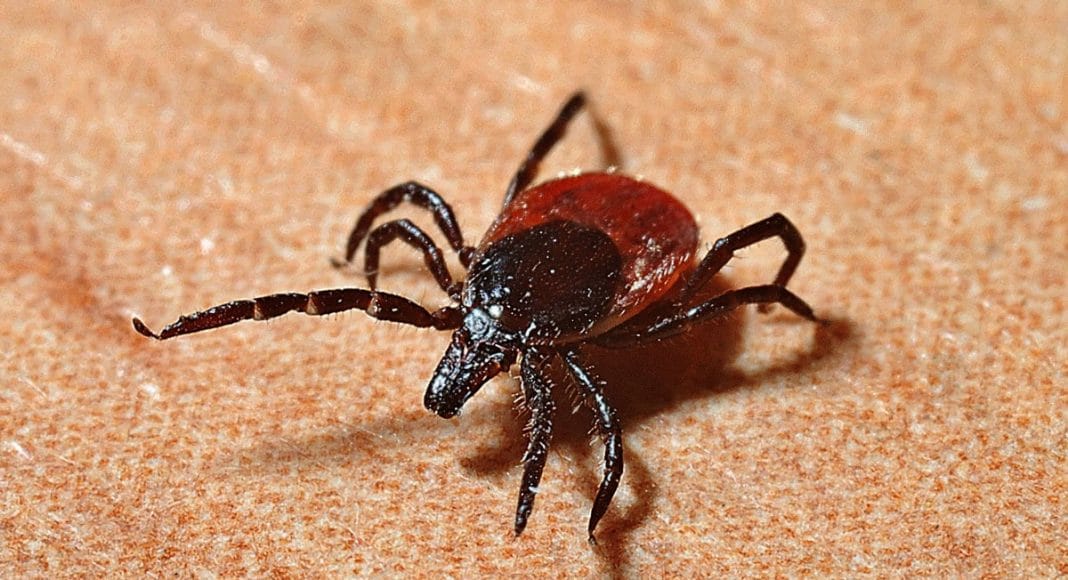Although tiny and unassuming, ticks can cause revulsion in people on sight. It’s not just because they are blood suckers and appear uninvited ready to make us their host meal. Ticks have caused untold human suffering throughout history by helping spread plague, fever, paralysis and a variety of other nasty conditions. In 1982, scientists made a connection between Lyme disease and some of the bites of certain ticks.
Lyme disease is a priority for the Centers for Disease Control because annual cases can exceed 27,000, up almost three-fold since the mid 1990s. Frighteningly, it affects the brain and nervous system. And it all starts by being bitten by one of the smallest insects we can see with the naked eye, the black-legged tick, AKA the deer tick.
Symptoms may not appear for days or even months after bite. Sometimes there is a telltale bullseye mark around the bite, though as many as half affected never get a rash at all. It is often misdiagnosed as MS, lupus, chronic fatigue or even as being psychosomatic.
Lyme disease can manifest as flu-like symptoms, fever, headache, extreme fatigue, pain in the jaw, neck, back / joint pain, swelling and even pain in the bones.
Caught early, physicians can treat Lyme disease with antibiotics to bring a quick and complete recovery. However, more rarely, some patients will experience chronic Lyme disease, also known as Post-Treatment Lyme Disease Syndrome (PTLDS).
Though no states currently list Lyme disease as a qualifying condition to be a medical marijuana patient, several (California, Connecticut, Massachusetts, Nevada, Oregon, Rhode Island and Washington) have expressed they will consider the allowance with a physician’s recommendation.
While no studies have shown cannabis to cure the condition, it has been shown to impact several of its common symptoms: chronic pain, insomnia/ restless sleep, inflammation and joint/muscle aches.
As a young child, Shawn DeNae was bitten by ticks. While that is not uncommon for people who hike, camp and play in wooded areas, these bites would begin a years long struggle with serious side effects from that simple encounter.
“I was bitten by ticks when I was 8 years old. By the time I was 15 I was having a lot of pain. My bones hurt all the time. I discovered cannabis and it helped the pressure behind my eyes and the achiness I experienced. I was diagnosed at 42 years old with Lyme Disease.” — Shawn DeNae
For DeNae, cannabis was a very effective remedy to the side effects she was feeling, more powerful than anything that has been offered by physicians. It is probably no mistake that, years later, she finds herself the chief executive of Washington Bud Company, a commercial marijuana producer run by her family and close friends. Not only does she help produce top shelf marijuana, she learned to make the products that helped her and now sells a line of non-intoxicating topical products, under the brand name Canis, to improve the quality of life of others.
“It (cannabis) helps. I use topical cannabis several times a day. I smoke cannabis to help. I use cannabis tinctures or concentrates under my tongue to help me sleep.” — Shawn DeNae
Of course, the best medicine is preventative. You can reduce your risk of exposure by being aware of where you are traveling and taking some precautions such as long sleeves and pants and use of insect repellent designed for this purpose.
If you are bitten by a tick, don’t panic. It is important to practice safe removal to prevent complications such as leaving the mouth embedded in the skin. Monitor yourself for symptoms such as the bullseye pattern around the bite. For good information about this and testing, check out the CDC resource on this topic.


